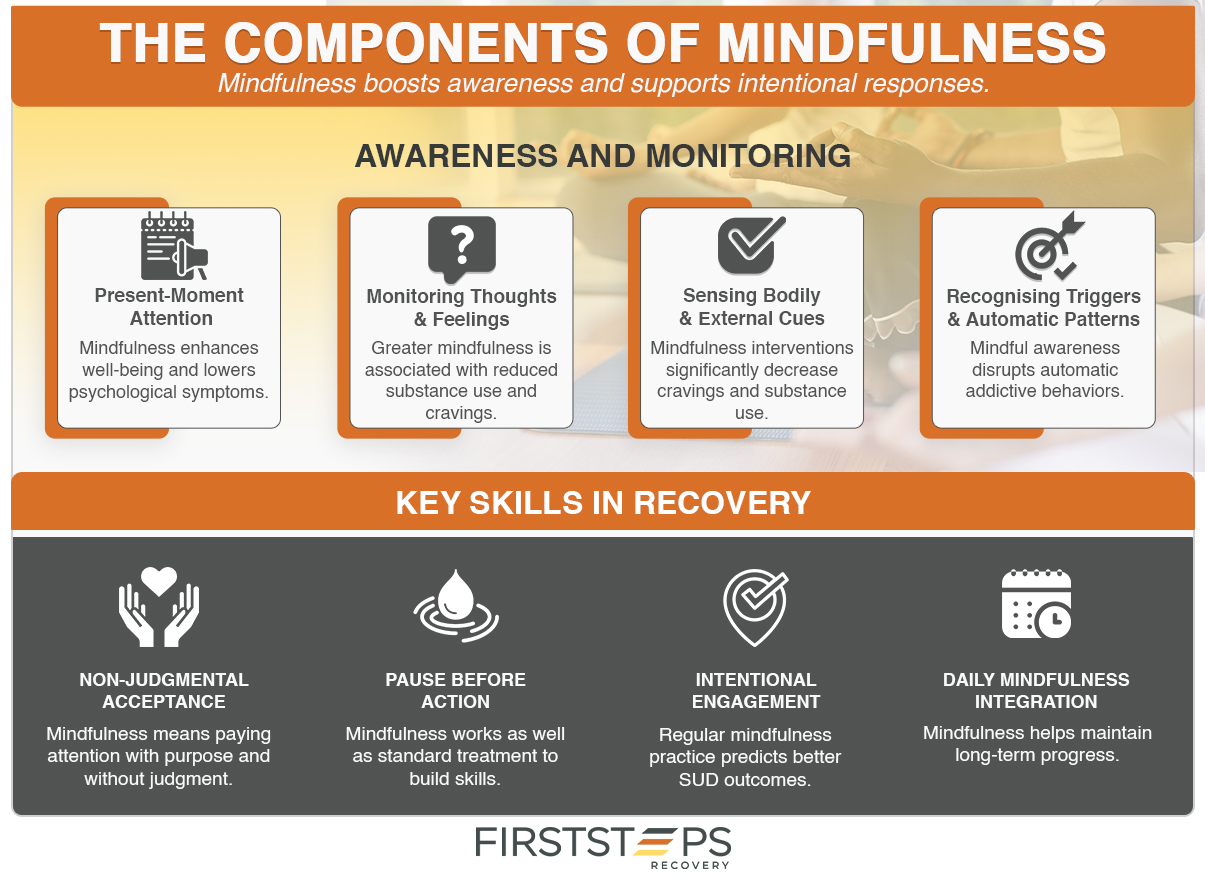
Mindfulness therapy is a form of mindfulness-based treatment, a broad category of therapeutic approaches that use present-moment awareness to support healing, emotional balance, and overall well-being. During mindfulness therapy, individuals learn to observe their thoughts, feelings, physical sensations, and surroundings without judgment. This heightened awareness helps them better recognize, understand, and interrupt negative or automatic patterns that may contribute to harmful behaviors.
Mindfulness-based interventions are widely used in both addiction treatment and mental health care. One well-known model, mindfulness-based cognitive therapy (MBCT), blends mindfulness practices with cognitive behavioral therapy to help individuals regulate their emotions and manage mood fluctuations. MBCT is especially effective for those experiencing depression and related conditions.
For individuals in addiction recovery, mindfulness therapy offers significant benefits. By increasing awareness and strengthening the mind–body connection, mindfulness helps people identify early warning signs of problem behaviors, challenge triggering thoughts, and respond to cravings in healthier ways. It also enhances self-regulation and impulse control, key skills for reducing relapse risk and navigating high-stress situations.
Mindfulness-based therapy is effective for treating substance use disorders and co-occurring mental health conditions. It supports individuals in managing cravings, reducing automatic or unconscious behaviors, and building long-term relapse-prevention strategies.
At First Steps Recovery, located in Clovis, California, within Ventura County, mindfulness-based therapy is one of the many holistic, evidence-based treatment options available. These approaches help clients cultivate resilience, emotional stability, and the coping skills needed for lasting recovery.
When it comes to mindfulness therapy, there are three different components that individuals will be taught to utilize:

One of the most common mindfulness practices is meditation. This practice has a long history, dating back thousands of years. The focus of meditation is integrating the mind and body in order to promote calm and feelings of well-being. Most meditation practices involve concentrating on a sensation, a sound, an image, or a mantra.
Practicing mindfulness-based stress reduction techniques and using general mindfulness techniques can help individuals manage cravings and emotional triggers, supporting the addiction recovery process. One effective mindfulness-based technique for managing cravings is urge surfing, which teaches individuals to observe their urges without acting on them until the craving passes. Knowing techniques to practice in the moment cravings strike can drastically improve treatment outcomes.
Mindfulness in and of itself is a type of meditation. It requires an individual to focus completely on their mind and their body. Meditation can help in several ways when it comes to addiction recovery, assisting individuals in working through cravings and preventing instances of relapse. Mindfulness techniques are valuable tools for long-term recovery, complementing other therapy methods and supporting emotional regulation. These techniques also help individuals develop healthier coping mechanisms for managing stress and cravings.
These practices can become an asset to individuals long after they leave a treatment center and provide them with the necessary tools they will carry with them throughout their recovery journey. Mindfulness meditation also offers many potential health benefits, both mental and physical in nature, and can vastly improve an individual’s life.
Mindfulness is particularly beneficial to those in substance abuse treatment. When a person finds themselves addicted to a substance such as drugs or alcohol, they experience cravings for that substance. These cravings worsen the longer they go without ingesting more of the substance. One of the key benefits of mindfulness in treating addiction is craving management, as it helps individuals handle and reduce the intensity of cravings.
Without mindfulness, the automatic reaction to these cravings is typically to locate and imbibe more of the addictive substance. But with mindfulness treatments are well-practiced, individuals learn to be conscious of their cravings. These practices are key components of relapse prevention strategies, helping individuals recognize and manage cravings and destructive behaviors.
Mindfulness also strengthens impulse control, enabling individuals to resist the urge to act on cravings. Once the person acknowledges these cravings, they are better able to assess what the right choice is in the situation. They can acknowledge that they crave the addictive substance but that it hurts their life, instead resorting to practices like urge surfing. Mindfulness practices allow people in addiction recovery to feel the discomfort that comes along with cravings without judgment while still inhibiting their automatic response to take part in drug or alcohol consumption.
Healing from addiction is more than just “going to rehab” and completing a treatment program. Detoxing from drugs can have an incredible physical impact, and many people enter addiction treatment in poor health. Substance use can sabotage a person’s ability to eat or sleep in healthy ways, and behaviors associated with addiction often include a diminished ability to practice self-care.
They can also help the person re-establish their relationship with their body and emotions, allowing for lower levels of emotional reactivity. After completing an addiction treatment program and returning to everyday life, the person is more equipped to handle stress and emotional distress. They know better, more effective ways to cope than using addictive substances that do more harm than good over time.
Holistic treatments also help individuals develop healthy coping skills, which are essential for managing stress and avoiding relapse. These approaches, including mindfulness, contribute significantly to stress reduction during recovery. This can improve treatment outcomes and support addiction recovery even when the person leaves treatment for substance use disorders. Apart from mindfulness, examples of holistic treatments for addiction treatment include:
Horses have been used in therapeutic healing practices for decades, with their unique abilities to bond with humans providing benefits outside a conventional therapy setting. Self-control and engagement in the moment during equine therapy sessions can provide an incredible sense of peace to those in recovery. Seeing direct, practical benefits of emotional control (such as the horse being comfortable enough for all a person to raise its hoof) can sometimes “sink in” better than learning about the principles of emotional control in an individual therapy setting.
Finding yourself caught up in addiction can be frightening, but help is possible. Dual-diagnosis treatment centers are created to help individuals who deal with addiction and co-occurring mental health disorders. Through practicing mindfulness, meditation, and a variety of different behavioral and experiential therapies, individuals at First Steps Recovery can learn the tools and skills required to battle and overcome addiction. Contact us today to learn more.

From our certified therapists and nurses to our emotional support animal "Cooper", our entire team is dedicated to the health and success of our clients throughout our program and beyond.
Have questions about our experiential therapies? Let’s talk.
Art therapy programs allow clients to use their creativity and imagination to make create art that expresses what they truly feel in a healthy and productive way.
Equine therapy works with clients that have behavior issues, autism, and developmental disabilities and works with vets suffering from PTSD.
Wilderness therapy is a therapeutic intervention that utilizes nature as a backdrop, and adventure and exploration as a tool for growth and self-discovery.
Music therapy in a drug treatment setting utilizes music and various forms of musical expression in order for clients to self‐reflect as well as to assess where they are at right now and where they want to be in their recovery.
Yoga utilizes physical postures and controlled breathing that help lengthen and strengthen the spine, increase flexibility, and help calm the mind.
Recreation recovery is a new way of living life. Living clean and sober opens people up to whole new ways of having fun and enjoying life.
Physical wellness plays a huge part in the success of recovery. Maintaining a healthy weight, and getting the proper amount of vitamins, minerals, and proteins are all essential to repairing the damage done by drugs and alcohol.
Mindfulness therapy is a type of therapy that focuses on learning to notice thoughts, feelings, and surroundings without automatic responses.
Dayatra L.
Melissa B.
Bruce G.
Have questions about how our alumni program works? Let's talk.










Have questions about First Steps Recovery? We're here to help.
© Copyright 2023 • First Steps Recovery • All Rights Reserved